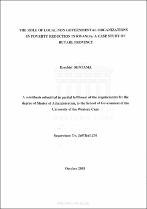| dc.description.abstract | Chronic poverty has always been described as one of the greatest structural problems facing Rwanda. The objective of the study was to examine to what extent local NGOs play and/or should play a role in poverty reduction in Rwanda in order to make the necessary recommendations. The field survey was conducted on four local NGOs, operating in Butare province, namely URWEGO, HUGUKA, HAGURUKA and DUTERIMBERE. The study design was qualitative, focusing on personal individual interviews as well as focus group discussions. The study used descriptive and analytical approaches, while interview, documentary and observation tools were used as techniques of data collection. The findings indicate that local NGOs play or land may play a crucial role - to a large extent - in poverty reduction in the sense that they are often participatory, responsive notably to local needs and able to mobilize communities and support poor communities. Local NGOs have the
potential to facilitate the effective participation and self-reliance of the poor communities. They support the poor in breaking out of their condition of poverty. However, the study revealed that local NGOs are still weakened by many constraints, notably their creation
(foundation) from outside, poor management, inadequate laws and especially the dependence burden. The study recommends that the creation of local NGOs should be initiated by people themselves. Local NGOs must progressively replace the "outstretched-hand" technique to foreign institutions with self-initiatives undertaking sustainable actions through local potential and resources. They should also collaborate with each other and with other development partners in order to gain an environment allowing them to perform their functions freely. This environment would provide a legislative and regulatory framework that guarantees the rights of local NGOs. In this regard, a department of cooperation and collaboration should be created in every district. | en_US |

